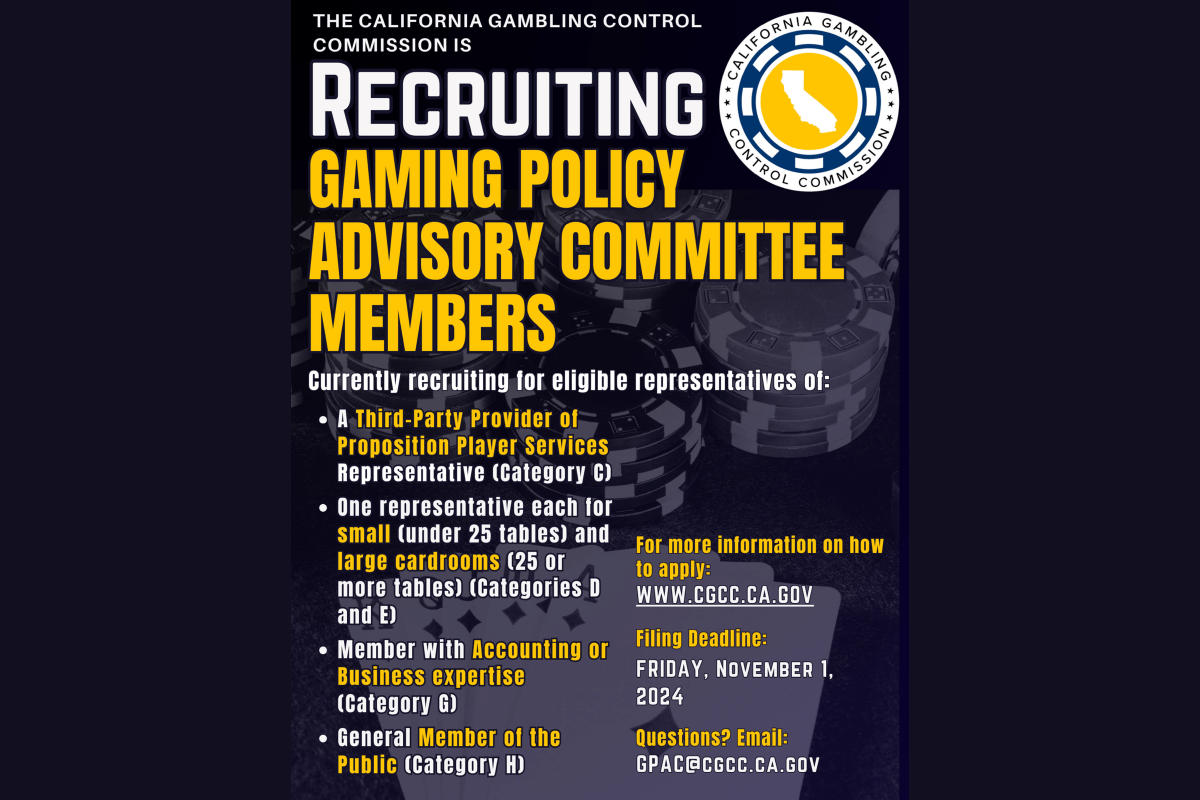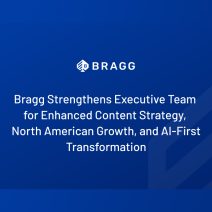
GAMING POLICY ADVISORY COMMITTEE – NOTIFICATION OF SEATS WITH TERMS EXPIRING DECEMBER 31, 2024
The Gaming Policy Advisory Committee (GPAC) is a ten-member committee established pursuant to Business and Professions Code section 19817 to provide advisory recommendations to the California Gambling Control Commission (Commission). Its membership, as appointed by the Commission, includes equal part appointments from the public as well as the cardroom industry.
The GPAC has the following five highlighted seats that have a term limit ending on December 31, 2024.
PUBLIC REPRESENTATIVES:
Category A: An employee from the Bureau of Gambling Control (BGC), Department of Justice (1 seat)
Category B: A representative from an agency or nonprofit concerned with problem gambling and/or gambling addiction (1 seat)
Category F: A representative affiliated with local law enforcement from a local government where an approved ordinance allows legalized gaming (1 seat)
Category G: A professional with an accounting or business background and not currently affiliated with a California legalized gambling entity (1 seat)
Category H: A general member-at-large not currently affiliated with any California legalized gambling entity (1 seat)
INDUSTRY REPRESENTATIVES:
Category C: A licensee, agent, or employee from a Third-Party Provider of Proposition Player Services (1 seat)
Category D: A licensee, agent, or employee from an actively licensed cardroom with 25 tables or more in operation (2 seats; 1 seat vacant ¹)
Category E: A licensee, agent, or employee from an actively licensed cardroom with less than 25 tables in operation (2 seats; 1 seat vacant)
The Commission is currently accepting applications through November 1, 2024, from all eligible applicants for the GPAC seats in the following categories: C, D1, E1, G¹ and H.
The GPAC Application and Selection Process can be found on the Commission’s website at www.cgcc.ca.gov. Applications should be submitted electronically to [email protected]. Interviews will be scheduled shortly after the application deadline (mid-November).
GPAC’s mission is:
The Commission is currently accepting applications through November 1, 2024, from all eligible applicants for the GPAC seats in the following categories: C, D1, E1, G¹ and H.
The GPAC Application and Selection Process can be found on the Commission’s website at www.cgcc.ca.gov. Applications should be submitted electronically to [email protected]. Interviews will be scheduled shortly after the application deadline (mid-November).
GPAC’s mission is:
“Provide advisory recommendations to the California Gambling Control Commission concerning matters of controlled gaming regulatory policy and other relevant gambling related issues, with special attention to guaranteeing the integrity of gambling operations and to deal effectively with problem gambling.”
The GPAC currently meets every eight weeks. GPAC meetings will be held via Zoom through the end of 2025 whereupon meetings will have to be a combination of in person and via Zoom. Audio recordings of previous meetings can be found on the Commission’s website.
The GPAC is an asset when addressing matters of importance for the cardroom industry. GET INVOLVED, whether through attending the GPAC’s public meetings, submitting an application for consideration of appointment to the GPAC, or by simply sending in comments for the GPAC’s consideration and discussion via the email address below.
“Provide advisory recommendations to the California Gambling Control Commission concerning matters of controlled gaming regulatory policy and other relevant gambling related issues, with special attention to guaranteeing the integrity of gambling operations and to deal effectively with problem gambling.”
The GPAC currently meets every eight weeks. GPAC meetings will be held via Zoom through the end of 2025 whereupon meetings will have to be a combination of in person and via Zoom. Audio recordings of previous meetings can be found on the Commission’s website.
The GPAC is an asset when addressing matters of importance for the cardroom industry.










